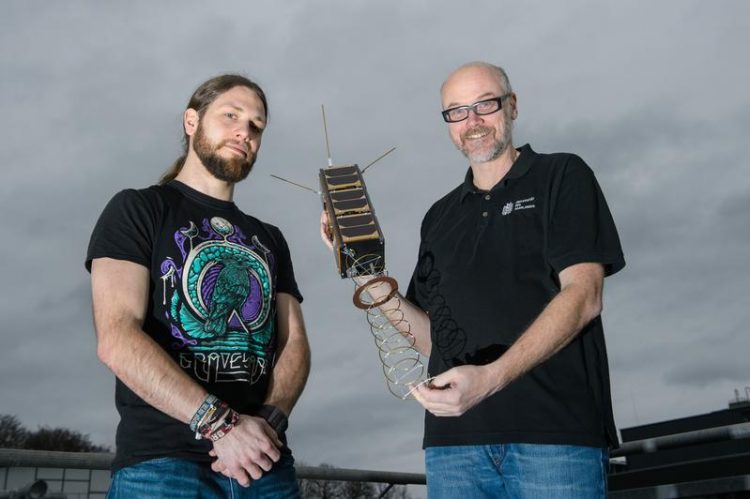Cebit 2017: Alumni of Saarbrücken Graduate School of Computer Science in Demand all over the World

Gilles Nies and his supervisor Holger Hermanns with the satellite whose missions they are securing with new computational models. Oliver Dietze
US entrepreneur Elon Musk is famous all over the world. His name is tied to the online payment system PayPal, as well as the electric car manufacturer Tesla, and he has just made global news with his plans to let two space tourists orbit the moon, with the help of his space travel enterprise SpaceX, as soon as next year.
“I would never have dreamed that I would meet this stellar investor myself one day, at an international astronaut convention in Mexico. Nor would I have dreamed that I might be working on a procedure that could revolutionize space missions,” says Gilles Nies, a doctoral student at Saarland University who is supported by the Saarbrücken Graduate School of Computer Science.
Numerous young researchers from all over the world apply for one of the 30 new openings offered each year. The Graduate School program is divided into two phases: During the preparatory phase, the students attend lectures on a wide range of computer science topics, while gaining deeper knowledge and insight into their field of research.
All doctoral students are assigned an academic mentor, and receive a monthly grant of at least 800 Euros from the Graduate School, so that they can concentrate entirely on their academic work. “Depending on their prior knowledge, this phase can be customized to meet the needs and interests of the individual students,” says Professor Andreas Zeller, responsible for admissions at the Saarbrücken Graduate School.
“Our doctoral students are free to familiarize themselves with various areas of research.” Students can do their research either at Saarland University, or at one of the renowned research institutes that have settled nearby on the Saarland Informatics Campus.
Apart from the two Max Planck Institutes for Computer Science and for Software Systems, these include the German Research Center for Artificial Intelligence (DFKI), the Intel Visual Computing Institute, the Cluster of Excellence “Multimodal Computing and Interaction”, the Center for Bioinformatics, and the budding Center for IT Security, CISPA. This means that students can choose between 75 different working groups, covering fields such as algorithms and data structures, computational biology and embedded systems, cybersecurity and machine learning.
The Graduate School continues to support the doctoral candidates during the subsequent dissertation phase. An additional advantage: In Saarbrücken, not just the supervising professor is responsible for a dissertation project, but the entire Computer Science department. Some 75 professors and researchers are there to support grad students with their research.
“With our offer, we are in fact competing with elite universities like Stanford and Cambridge,” says Zeller. Saarbrücken Graduate School alumni have made it into in a whole range of research institutions worldwide after graduating. “Some of our former PhD students have stayed in research, at the Swiss Institute of Technology ETH in Zürich for example, while others work for technology companies like Google or Facebook. Others yet have realized their own ideas and started a business. Here, the local IT Incubator provides additional advice and support as a technology transfer center for founders,” Zeller reports.
Gilles Nies is not thinking about the time after graduation just yet. At the moment, he is still enjoying his research in the context of a space mission: “It’s still exciting and fascinating to me. Space is somewhat intangible, and that makes it strangely attractive.”
Background: Saarbrücken Graduate School of Computer Science
Apart from the Computer Science department at Saarland University, the institutions participating in the Graduate School are the two Max Planck Institutes for Informatics and for Software Systems, the Center for IT Security, Privacy and Accountability CISPA, the German Research Center for Artificial Intelligence DFKI, and the Intel Visual Computing Institute. Since 2007, the Graduate School has been funded by the Initiative of Excellence of the German federal and national governments, presently in its second round.
Further Inquiries:
Dr Michelle Carnell
Managing Director
Saarbrücken Graduate School of Computer Science
Phone: +49 681 302-5523
E-Mail: carnell@cs.uni-saarland.de
Prof. Dr. Andreas Zeller
Phone: +49 681 302-70971
E-Mail: zeller@cs.uni-sb.de
Editor:
Gordon Bolduan
Science Communication
Competence Center Computer Science Saarland
Phone: +49 681 302-70741
E-Mail: bolduan@mmci.uni-saarland.de
Media Contact
All latest news from the category: Trade Fair News
Newest articles

First-of-its-kind study uses remote sensing to monitor plastic debris in rivers and lakes
Remote sensing creates a cost-effective solution to monitoring plastic pollution. A first-of-its-kind study from researchers at the University of Minnesota Twin Cities shows how remote sensing can help monitor and…

Laser-based artificial neuron mimics nerve cell functions at lightning speed
With a processing speed a billion times faster than nature, chip-based laser neuron could help advance AI tasks such as pattern recognition and sequence prediction. Researchers have developed a laser-based…

Optimising the processing of plastic waste
Just one look in the yellow bin reveals a colourful jumble of different types of plastic. However, the purer and more uniform plastic waste is, the easier it is to…



